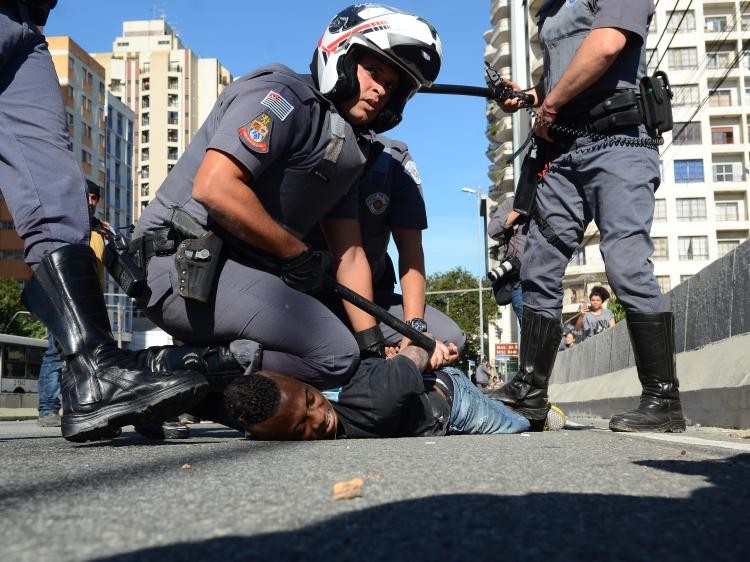by Luana Ozemela
I woke up this morning to read a message from a friend which had the content of an article published in a well known Brazilian magazine. Like most black Brazilians, I initially lacked access to the magazines’ paid subscription but was later able to gain access to read the article. The message was accompanied by a photo of the United States map highlighting the states where protests were happening as a result of the killing of George Floyd. About 60% of the map was red showing how widespread the protests had reached in a matter of days of the killing.
The message also came with a video already subtitled in Portuguese of a lady speaking powerfully about the reason why people are burning down buildings in Minnesota and across the USA. She spoke about the mental illness of racism which is stubbornly infiltrated in all parts of Americas institutions resulting in the insatiable killing of black people over the years. She adds that looting and violence in the protests are but a reflection of that which has been transmitted from white oppressors.
Having lived in Washington DC, the capital city and the heart of the 1968 incendiary four-day civic uprising following the assassination of Martin Luther King Jr., having spent time with African American communities, activists and policy makers in the US, and having watched and heard what Americans watch and hear 24/7 on TV, black twitter, radio, schools, churches, supermarkets, barber shops and nail saloons, I can feel in my bones the pain, the suffering and the indignation over George Floyd and countless other deaths of unarmed black men and women in the hands of the police in the US.
Whilst still wondering how the black community in DC might be fairing with all the recent happening, I began reading the article sent to me entitled “Why don’t black Brazilians revolt like the Americans?”. The author was alluding to the apparent silence of the black Brazilian community, after the deaths of João Pedro (14 years old), Ágatha Félix (8 years old), Kauê Ribeiro dos Santos (12 years old), and Kauan Rosário (11 years old), all killed by the police in the last 12 months in Brazil. The author began by saying that the answer is simple: “Because Brazilians are Brazilians, and Americans are Americans”. Shocking!
The author then explains a little further raising two important points of distinction between African Americans and Afro-Brazilians: 1) unified black identity and 2) an afro-centric education, which according to him African Americans have and Afro-Brazilians don’t have. However, the author gets a bit carried away when comparing Lauryn Hill to a popular Brazilian singer called Anitta citing that the former released one of her album covers inspired by 1933 Carter Woodson’s book “The Miseducation of the Negro” to demonstrate the African American superior level of education and activism compared to what is observed in Brazil. A flawed comparison in my opinion because it undermines real Afro-Brazilian artists who have used their art to protest and express their views on racial equality.
Also, the author’s dismissal of the legacy of the protests led by Brazil’s Black movement is disappointing. In his article he only credited one protest, the undoubtedly important black revolt called the “Malê’s Revolt” in Bahia in the 19th century, inferring that it only happened because those behind it were African muslims and educated enough to identify themselves as a group.
I gathered my thoughts to try to add some more context, which is missing from the article, perhaps due to word count limitations to which I am happily not necessarily constrained to.
The first is the fact that blacks in Brazil have ALWAYS protested. So, to say or imply that black Brazilians are passive or dismissive of the injustices and oppressions that go on and on all over the country and around them is very inaccurate, to say the least. The 1970s and 1980s had relentless protests such as the Night March for Racial Democracy, which took place in São Paulo for over a decade. Leveraged by the democratization processes in Brazil and amplified by the initiatives of the black movement directly interested in a new social rights agenda with race equality at the forefront. The emblematic protest against Racism, for Citizenship and for Life, held on November 20 1995, mobilized more than 30 thousand people in Brasília, to denounce the absence of public policies for the black population.
And let’s not forget the yearly Black Women Marches which mobilize thousands of women from every corner of Brazil and from other countries in Latin America, sometimes more than fifty thousand (50,000) of them coming together to protest peacefully in front of the Presidential house for access to education, the end of the black genocide, and for race and gender economic equality.
With no structure or funding for large mass mobilizations, the black movement had to build broad and ingenious alliances through its grassroots entities and other organized collectives to reach high numbers of people.
However, the greatest obstacle to black protest in Brazil is the hegemonic myth of racial democracy engrained in the national culture and used to demobilize and delegitimize the movement. So black activists are not only restricted economically and politically, but, above all, culturally by a societal racist normality of black invisibility. Despite these barriers, the black movement has been relentlessly seeking for institutionalized spaces for negotiation before society and the State. The words of order during the march of November 20, 1995 were “React to racial violence!”; “Blacks want power too!”; “Palmares! Zumbi! So I resist!”; “We want education, we want jobs!”; “Zumbi lives, Racism, not!”.
These five slogans are probably the best way to explain the difference and similarities between African American and Afro-Brazilian protest. Brazilians lack economic, educational and political representation, as well as face racism, discrimination and extermination by the police and the State in overwhelming levels. And just like in the US, the Black movement has never stopped.
However, sadly Brazil has gone backwards and criminalizes social movements today in a much more perverse way, institutionalizing repression with new measures to crackdown on demonstrations, bringing criminal charges to detained activists, and other repressive judicial decisions against demonstrators and journalists, and in some cases approval of bills that restrict the right to protest. In Brazil, it is uncommon to even investigate abuses and illegalities committed by police even of high profile cases such as Marielle Franco. In fact what we see today is high level government officials commending violent police actions and judges issuing restrictive decisions on the right to protest, which further perpetuates the cycle of violations. Not much different from the US today, but perhaps not as visible.
It is true that despite laws being passed in 2003 mandating African and Afro-Brazilian history curriculum in schools, children grow up knowing more about Anitta’s life and lyrics than Zumbi dos Palmares which has a huge effect on black identity and consciousness. But it is also true that despite the complete erasure of Black history and scholarly work, Afro-Brazilians protested and continue to protest.
Race inequality in the US is as perverse as race inequality in Brazil. The only difference is the level at which inequalities are at play. African American per capita household income is 10 times larger than Afro-Brazilian’s, undoubtedly resulting in better educational outcomes. In fact today, about 9% of black adults are illiterate in Brazil.
And today still, while more than 70% of garbage collectors and domestic workers are black, Blacks represent less than 5% of those in executive positions of top 500 companies.
However, our black solidarity has no borders, language barriers or room for petty comparisons. We are united with our African American brothers and sisters in the same anti-racism struggle. We are also united with our brothers and sisters in the African Continent in our collective decolonization struggle.
I know for a fact that a tale of passivity has been told about our Afro-Brazilian struggle nationally and internationally. Internationally, it has not been made visible enough by Afro-Brazilians themselves for other communities to make real sense of it. And nationally, articles like the one I read this morning have been a real disservice to the struggle because it influences peoples perception of blacks and the strength or weakness of the black movement.
The world must learn and appreciate the relentless struggle for freedom, anti-racism and anti-blackness of our giant Black women and men in Brazil and, Afro-Brazilians must continue to stand up united occupying online and offline spaces of speech and action. Together we are stronger.



